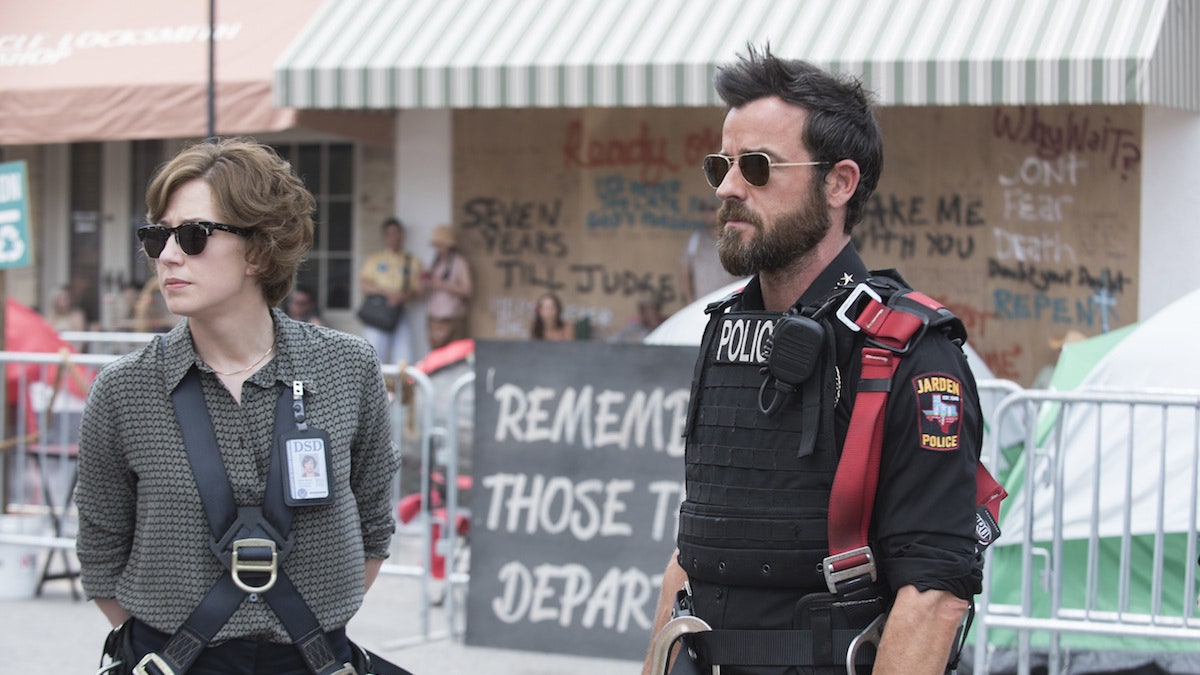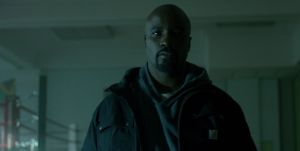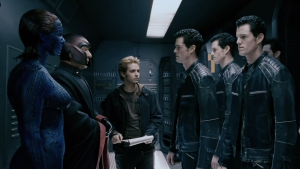
This article contains plot details from all three seasons of The Leftovers but no finale spoilers.
What is the purpose of a great TV show? Is it to make us forget about our troubles for an hour or two while the stressors and traumas of everyday life fade into the background? Should the characters on the screen give us a blueprint for our own decisions? Perhaps a good laugh or a twisty cliffhanger provides a thrill that a boring nine-to-five corporate job simply can’t.
HBO has often elevated the television viewing experience above these simple motivators, crafting stories that evoke deeper meaning and elicit emotional responses. The Sopranos, The Wire, Game of Thrones—all these famous series jolt to the top of the network’s Mount Rushmore, but perhaps one unfathomably underrated show hurdles them all, and it just turned 10 years old this week.
The Leftovers is unlike anything ever put on the small screen. Created by venerable TV fixture Damon Lindelof (Lost, Watchmen) and based on the novel of the same name by Tom Perrotta, this supernatural drama mixes genres in a way that makes it almost impossible to describe to someone who’s never had the privilege of watching it. The Leftovers digs into the deepest part of the human experience with a horrifying question: what if the ones we loved disappeared without a trace?
Initially set in Upstate New York but eventually detouring to Texas and Australia, the series dives headfirst into the aftermath of a post-apocalyptic event in which two percent of the Earth’s population vanishes. While nearly every person on the planet has been impacted in some way by this nonsensical event known as the “Sudden Departure,” the show hones in on the lives of one specific family: the Garveys. Kevin Garvey (Justin Theroux), his eventual girlfriend Nora Durst (Carrie Coon), and Nora’s brother Matt Jamison (Christopher Eccleston) are the three protagonists for the majority of the series.
While it would have perhaps been easier to make The Leftovers a sci-fi mystery in which society attempts to figure out the science behind how and why the rapture occurred, Lindelof and the writers’ brilliant decision to peel back the trauma caused by the disappearances through three broken individuals crafts an experience that captures the melancholy of the contemporary human plight. In the process, there has never been a more haunting, thought-provoking, or prescient story put on TV.
The Leftovers As a Thought Experiment
The series’ trigger event begs for answers, almost like a fish in the ocean just out of reach of the line. Why did it happen? Is there an alternate dimension that the disappeared go to? Is it the wrath of an angry deity that finally had it with the state of the universe? Why did the people who disappeared deserve such a fate?
Across three seasons, all of these questions are asked, but very few, if any, are given concrete answers. The decision to leave all of these mysteries open-ended allowed for a program that mirrored the reality of real life more than anybody could have imagined. Every day, people suffer without answers. Why do innocent kids get cancer while evil politicians live into their 90s? How did any of us get here in the first place? Is it an all-powerful God? Did everything really evolve from nothing in a Big Bang? If God is real, how does it make sense that he’s always existed?
We could go on all day debating the infinite ambiguities of life. Existentialist dread bears down on all of us at one time or another. The Leftovers represents these philosophical questions on steroids with a supernatural cataclysm that has next to no chance of happening in real life but causes an influx of anxiety, depression, and apprehension.
Kevin’s wife, Laurie (Amy Brenneman), joins a cult. Matt believes that Kevin is a messiah who will redeem the human race. The citizens of Jarden, Texas lean into the thought that they were blessed by divine intervention because none of their people departed. The show covers such vast ground in such a small amount of time that it feels almost unfair. Each character lives a unique and personalized experience that reflects how actual people would react if a departure happened in our lives.
Some would turn to religion, while others would lose all hope and become suicidal. The COVID-19 pandemic ironically gave us a small look into what a tangible reenactment of The Leftovers would resemble. The show would most likely do even better a decade later because of this. When faced with the reality of life’s mysteries, the human response becomes just as muddled as the catalyst of such scenarios.
The Leftovers Forces Us to See Life’s Beauty
Through all of these overwhelming questions, someone who has never watched The Leftovers might think the show is nihilistic or disturbing. Yes, there are plenty of nauseating, butterflies-in-the-stomach moments throughout the 28 episodes, but what makes the series one-of-one is how heart-achingly beautiful the takeaways are. Lindelof and his team pry the shiniest gleam of optimism from the most daunting situations. Through the commitment of the underrated cast and writers, fans will finish the series finale with a born-again purpose and a poignant perspective on being alive.
Instead of ending each character’s story with a concrete conclusion plot-wise, the show resolves much of the innate emotional turmoil that pollutes everyone’s lives regardless of their outcome. The protagonists come to grips with their personal demons by gleaning their own answers from the Sudden Departure’s wrath. They mold this new world like clay and take control of their existence. Kevin, Nora, and Laurie mourn the past, but they no longer obsess over it.
The Leftovers ultimately is a requiem for the beauty in the unknown. It reminds viewers that the purpose of the human experience isn’t to know the why or how, but to revel in the emotion of the now. Just as the second season title song so eloquently sings, “let the mystery be.”
All three seasons of The Leftovers are available to stream on Max in the U.S. and Sky and Now in the U.K.
The post The Leftovers Perfectly Captured the Confusion of the Human Experience appeared first on Den of Geek.








